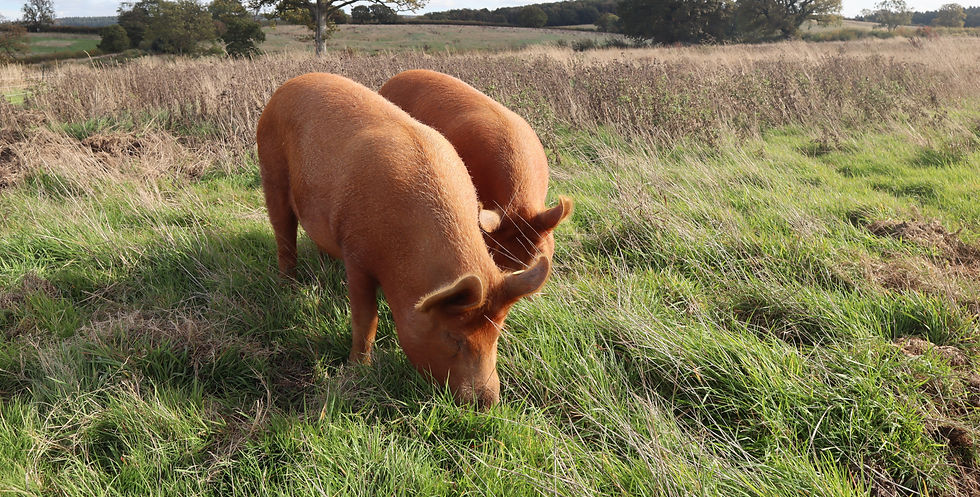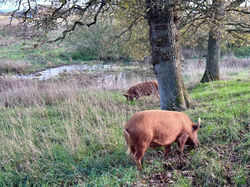
Pigs
Meet Ticket and Tailor, our ecosystem engineers!
Heal Somerset is home to two Tamworth pigs called Ticket and Tailor, whose job on site is to act as proxies for wild boar.
Wild boar play a crucial role in a healthy ecosystem, by disturbing the ground through rootling, spreading seeds, creating habitat, redistributing nutrients and unearthing food for other species.
Boar rootle to look for food such as worms, insects and roots, using their snouts to churn up the ground and uncover what might be lying beneath it. This action has lots of benefits, read on to find out more.
Unfortunately, there are very few wild boar left in the UK. That's why we, along with many other rewilding projects, have turned to Tamworths to take on the role of their wild ancestors.

The benefits of bringing pigs onto a rewilding site
Seed germination
Tamworth pigs are great for seed germination and dispersal. Through rootling, they create the bare earth that plants need for their seeds to germinate. This action also churns up dominant grasses, giving a greater variety of species the space to grow. On top of this, their thick, wiry hair acts as a seed disperser. Seeds get caught in their coat and are then deposited in different areas as they travel through the land.
Microclimates
Through their rootling and wallowing, pigs create microclimates. Water collects in the ruts and divots caused by pigs rootling, creating tiny, ephemeral pools of water which are important for a range of invertebrates. The same happens when pigs wallow. They create mud pools which provide a home for amphibians, dragonflies and aquatic plants. The disturbed ground from rootling also provides warm basking spots for grasshoppers and burrowing opportunities for lots of species of bees, wasps and beetles.
Unearthing food for all
You’ll often notice other wildlife such as robins following pigs around. That’s because pigs rootle out worms, grubs, seeds and other delicious snacks that other animals can then eat.
Allowing the pigs to roam free
In November 2025 we removed the electric fence around the pigs' enclosure to let them roam free within the boundaries of our new deer fence - an area of around 81 hectares (just under 200 acres).
The pigs are now true ecosystem engineers, with a whole landscape in which to rootle for food and create new habitats for wildlife.

Find out more about Ticket and Tailor and how they will adapt to roaming free via the Q&A below.
Watch Ticket and Tailor's arrival on site
A huge thank you to B Corp events ticketing platform Ticket Tailor, who enabled our pig project. The boys are named Ticket and Tailor in their honour!










